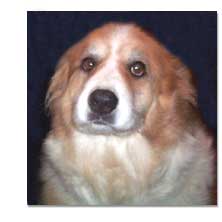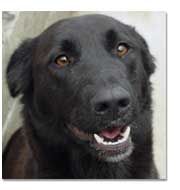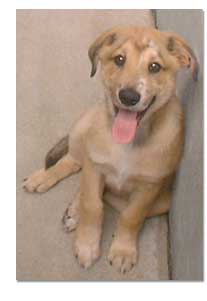 |
|
|
 |
 |
 |
Stupid Dog
--Written By Michael Schmidt


It is a fact the vast majority of "stupid" dogs are labeled "stupid because they failed to live up to the unrealistic expectations of "owners" or perhaps "masters" that anthropomorphize.
an-thro-po-mor-phize \ -,fiz \ vb (1845):
To attribute human form or personality to things not human.
an-thro-po-mor-phism \ -,fiz-em\ n (1753):
An interpretation of what is not human or personal in terms of human or personal characteristics: HUMANIZATION
Many people are ignorant and believe that dogs can think and behave like humans. Many people are arrogant and believe that dogs should behave like humans. Anthropomorphism is common in our society because it is common for our view of animals to be distorted by ignorance and arrogance. Consider the following thoughts from "the Outermost House" written by Henery Beston in 1928:
 "We need another and wiser and perhaps more mystical concept of animals. Remote from universal nature, and living by complicated artifice, man in civilization surveys the creature through the glass of his knowledge and sees thereby a feather magnified and the whole image in distortion. We patronize them for their incompleteness, for their tragic fate of having taken form so far below ourselves. And therein we err, and greatly err. For the animals shall not be measured by man. In a world older and more complete than ours they move finished and complete, gifted with extensions of the senses we have lost or never attained, living by voices we shall never hear. They are not brethren, they are not underlings; they are other nations, caught with ourselves in the net of life and time, fellow prisoners of the splendour and the travail of the earth." "We need another and wiser and perhaps more mystical concept of animals. Remote from universal nature, and living by complicated artifice, man in civilization surveys the creature through the glass of his knowledge and sees thereby a feather magnified and the whole image in distortion. We patronize them for their incompleteness, for their tragic fate of having taken form so far below ourselves. And therein we err, and greatly err. For the animals shall not be measured by man. In a world older and more complete than ours they move finished and complete, gifted with extensions of the senses we have lost or never attained, living by voices we shall never hear. They are not brethren, they are not underlings; they are other nations, caught with ourselves in the net of life and time, fellow prisoners of the splendour and the travail of the earth."
We can never be certain how an experience will affect a dog. However, by opening ourselves to understanding its ways, we certainly improve our chances of working successfully with the dog. Some aspects of dog training involve universal truths that are relevant when working with any animal. To name a few:- To willingly do what you want, the animal must first understand what it is that you want.
- It is very difficult for an animal to learn what you want it to do - when it is not paying attention to you.
- In seriously stressing an animal while giving it no clear way to win (reduce stress), one always displays some combination of arrogance, ignorance, and incompetence.
- An animal is always learning from and reacting to it's environment (being trained) - not just during formal training.
Understanding these things is very important. However, it is not enough - you also have to understand something about how your dog sees the world. Without this understanding, you and your dog will not live in harmony.
 In her book "Animals as Teachers and Heelers", Susan McElroy writes of interesting conversation she had with Norm Bishop who at the time was working on the Yellowstone recovery plan. Norm was talking about how we tend to hurt so profoundly the things we do not understand. He reminisced about a very special dog that he had owned many years before. In describing the dog, Norm said "It was wolfish in many of it's manners, including its way of greeting - leaping up to nuzzle, lick, and nibble at my face". Norm said that sometimes his dog would accidentally catch the septum of his nose in those greetings, and it hurt. "I'd swat him away…hit him" he admitted. "Years later, when first I saw films of wolves greeting each other, it was like seeing my old dog. Have you ever seen wolves greet one another? They nose and push at each other's faces. Suddenly I realized that all that leaping and nibbling was his way of showing respect, devotion, love, honor and joy - all the good things I meant to him. And I hit him because I was hurt and annoyed and didn't understand. I wonder what it was like for him to be hit. It must have been utterly confusing to be so completely misunderstood." In her book "Animals as Teachers and Heelers", Susan McElroy writes of interesting conversation she had with Norm Bishop who at the time was working on the Yellowstone recovery plan. Norm was talking about how we tend to hurt so profoundly the things we do not understand. He reminisced about a very special dog that he had owned many years before. In describing the dog, Norm said "It was wolfish in many of it's manners, including its way of greeting - leaping up to nuzzle, lick, and nibble at my face". Norm said that sometimes his dog would accidentally catch the septum of his nose in those greetings, and it hurt. "I'd swat him away…hit him" he admitted. "Years later, when first I saw films of wolves greeting each other, it was like seeing my old dog. Have you ever seen wolves greet one another? They nose and push at each other's faces. Suddenly I realized that all that leaping and nibbling was his way of showing respect, devotion, love, honor and joy - all the good things I meant to him. And I hit him because I was hurt and annoyed and didn't understand. I wonder what it was like for him to be hit. It must have been utterly confusing to be so completely misunderstood." |
|

